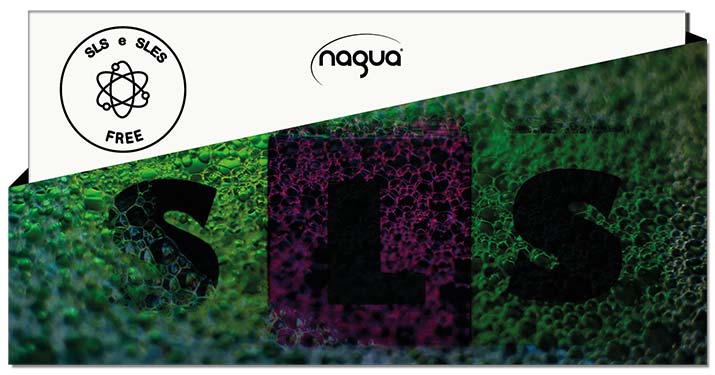eco productswithout SLS and SLES surfactants
What are SLS and SLES?
Sodium Lauryl Sulfate (SLS) and Sodium Laureth Sulfate (SLES) are surfactants, i.e. substances able to "dissolve" greasy dirt and facilitate its elimination through rinsing.
They are often used to increase the foaming and washing performance of products. In fact, because they are very cheap and produce a lot of foam, they are extensively used in cleaning and body care products.

An SLS product has been processed with some ethylene oxide molecules, this means that petroleum-derived molecules are added to the compound.
It is important to remember that any organic substance and/or mixture used in detergents with surfactant properties is not good for the environment, and probably not good for your health either.
Products that may contain surfactants
We can find surfactants in many detergents, shower gels, shampoos, soaps and many others. We can also find them, however, in dentifrices, intimate soaps and personal hygiene products.
Impact on health
SLES and SLS surfactants attack the hydrolipidic layer that protects the skin, causing irritation and redness in the most sensitive people.
The main problems, if they present themselves, are at the dermatological level. These, in fact, are non-natural substances that disturb the balance of the skin (especially if used frequently and for long periods), causing dehydration, dryness and impoverishing the appearance of our hair.
It is important to note that although there are many studies that point out that these substances are carcinogenic, there is still no unanimous conclusion. What we do know is that SLES and SLS are aggressive and, along with dirt, also tend to "wash away" part of our skin's protective lipid layer.
Why are they harmful to our skin?
The surfactants tend to make the pH of the skin temporarily basic, so they are not recommended for those with dry or particularly sensitive skin. As for the hair, however, it is good to be careful because a too aggressive shampoo tends to dehydrate the scalp, which will flake more. What does it mean? The scalp, when dehydrated produces more sebum to rebuild its natural lipid film, so hair will be oilier and more dehydrated.
So, the risks to our health are many. Since they are not biodegradable, they remain "stuck" to surfaces increasing skin sensitivity and worsening allergic contact or irritant dermatitis.
Environmental impact
The Nagua products do not have SLS and SLES: we want a line that respects the environment and our bodies! There are natural alternatives that are gentle on the skin or hair and have minimal environmental impact.
Surfactants are not only non-biodegradable, they are also responsible for the phenomenon of water eutrophication. Being derived from sulfur, phosphorus and nitrogen, they make aquatic plants proliferate more than they should, generating the phenomenon that waters are infested by a very high quantity of algae.
A particularly dangerous phenomenon because aquatic animals cannot consume enough algae to "clean up" the waters. The remaining microalgae increase bacterial activity, reducing the amount of oxygen in the water, going so far as to "suffocate" the fishes!
In recent years, it has been discovered that some types of surfactants, when used in large quantities, are harmful to health. So, when you make shopping, try to avoid products with surfactants.
Studies & Sources
Valerie C. Robinson', Wilma F. Bergfeld, MD, FACP, Donald V. Belsito, MD, Ronald A. Hill, PhD, Curtis D. Klaassen, PhD, James G. Marks Jr, MD, Ronald C. Shank, PhD, Thomas J. Slaga, PhD, Paul W. Snyder, DVM, PhD, e F. Alan Andersen, PhD - "Final Report of the Amended Safety Assessment of Sodium Laureth Sulfate and Related Salts of Sulfated Ethoxylated Alcohols"- International Journal of Toxicology 29(Supplement 3) 15lS-161S © The Author(s) 2010